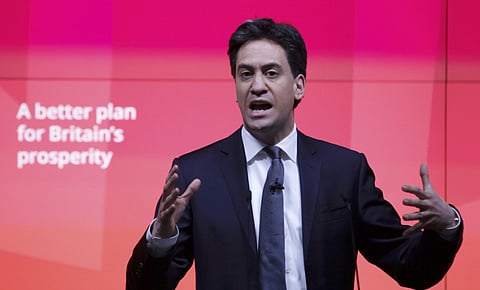Policy is trivial, personality is destiny
Britons will have a gut impression of the key political characters

The most important general election in a generation,” as British Prime Minister David Cameron rates it, is no such thing. The last one, in 2010, mattered more. With the euro succumbing to its design faults, Britain had to decide how quickly to trim a fiscal deficit that weighed in at 11 per cent of national income.
The skies are clearer now, if not cloudless. And while voters face a choice on May 7 about the size and contours of the state, the choice is not as polar as it was before the governing Conservatives softened their plans in the recent budget.
This may be why the campaign still smells of unignited gasoline. It will surely catch fire at some point, but we have been saying that all year. Britons are gripped by the sacking of a blokeish television presenter and the twilight phase of the football season — anything but the election that was formally commenced by the prime minister on Monday. Last week, he and Ed Miliband, the Labour opposition leader, volunteered for a gruelling interrogation on live television. They drew a third as many viewers as the first television debate in 2010.
Still, the election matters, but not for the reason Cameron implies. Pitted against each other are two mildly different policy programmes but two drastically different personalities. In their cast of mind, he and Miliband are as dissimilar as any two people who have vied for the premiership in recent decades.
We are meant to resent the focus on personality in politics. This is priggish. Personality does so much to determine a government’s performance that, if anything, we do not talk about it enough. In a country as centralised as Britain, the government of the day is a magnification of the prime minister’s character. By contrast, a manifesto says what a party would do in a world of favourable circumstances and zero disruption. We take these documents too seriously.
Their television performances confirmed what the past five years have told us about the personalities of these men. Cameron is serious but bloodless. Miliband is passionate but flaky. The prime minister is something of a magistrate, keen on public service to no particular end. His rival believes in big causes, to a point verging on credulity.
Miliband is seized by his beliefs, which is why he electrifies a doughty sect of followers and leaves most voters nervous about his capacity to make hard decisions. Cameron prefers the mask of command and talks of values and visions so reluctantly that the words seem to sting his throat as he utters them. He inspires nobody, but convinces most of his fitness for high office.
Miliband, in his Fabian way, thinks an intellectual is someone with a synoptic view of how to change the world. Cameron, Tory to his marrow, sees doubt as the mark of a first-class mind. Miliband strains to operate at the outer limits of his potential; his pluck and earnestness won respect during his television outing. Cameron is so magisterial as to make you wonder whether the words “talent” and “latent” come from the same Latin root.
Cameron complains of bureaucratic inertia in government as if he does not have ultimate responsibility for cutting through it. Miliband talks as though there is a lever in 10 Downing Street labelled “higher productivity” that Cameron unaccountably refuses to pull. In short, Cameron underrates the power of his office and Miliband overrates it.
If personality is destiny, we can make an educated guess as to how each leader would govern over the next five years. Another Cameron administration would be pushed around by events and Tory eurosceptics. He lacks the ideological rudder to see off these pressures. When a crisis springs from nowhere, he will shine. The rest of the time, his premiership will be marked by a mix of drift and stodgy competence.
His final years in power might evoke those of John Major — another Tory who governed as well as he could, while bleeding authority by the week. On the maxim that negative campaigning only works when it is quietly accurate, a shrewder Labour party would now be painting Cameron as a moderate doomed to be tugged right by his party.
It is possible to script a Miliband government too. He would dash left for a year, tampering in markets and raising taxation at the top end. He would over-reach, upset voters and businesses, and end up sheepishly governing from the centre for the sake of survival. Soon, Miliband would have the weary look of someone who knows he is not going to change the world after all.
The same retrenchment was forced on Francois Mitterrand in France in the 1980s, Bill Clinton in America in the 1990s and again in France under Francois Hollande. Left-wing leaders in rich countries do not bring “chaos”, as the Tories suggest. The truth is more damning: Their ideas rarely survive contact with the realities of power.
Voters will enter the polling booth with a sketchy idea of the economic choices on offer. The Tories’ commitment to overall budget balance, Labour’s preference for capital spending — these and other distinctions are too opaque to move the average Briton, who knows that policies are changeable anyway. Personality, by contrast, is relatively constant. As their pencils hover over the ballot, people will have a gut impression of the characters asking for the right to rule them, and decide accordingly. Voters know that superficialities are what really run deep.
— Financial Times


